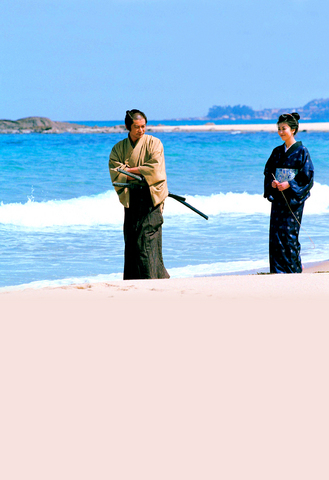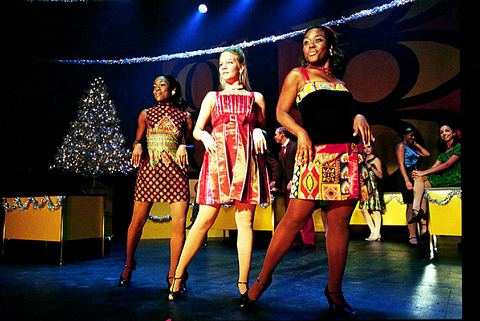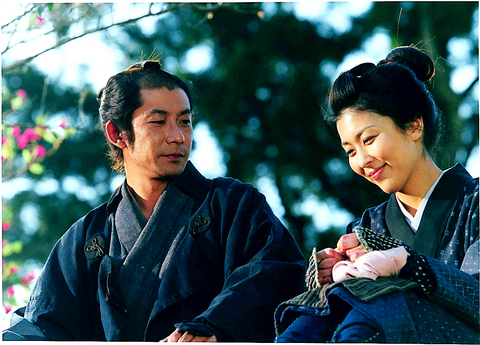The 62nd Venice International Film Festival which started yesterday has a strong Chinese feel about it this year and the martial art masterpiece Seven Swords (
Hong Kong singer/actress Sammi Cheng (
It is also a good year for Taiwanese productions. Fall ... In Love (

In celebration of the centennial of Chinese cinema, the festival has curated a retrospective section on Chinese films from the 1930s to the 1990s in its program The Secret History of Asian Cinema. Internationally acclaimed director John Woo (
Back to the local scene. This week ravers and electronic music lovers will get a kick from the highly enjoyable film It's All Gone Pete Tong, a comedy depicting the tragic life of the legendary (and totally fictional), world-class DJ Frank Wile.
In this mock-biographic film, Frankie Wile is the self-destructive genius of the UK techno/dance scene, who loses it with a sex, drugs and rock 'n' roll lifestyle. Tragedy strikes when a hearing disorder worsens until Frankie is completely deaf. He locks himself away in depression and gradually learns to accept his deafness and then finds a new perspective on life.

Camp is Broadway musical star Todd Graff's debut on the big screen. The film draws on the director's personal experiences and tells of a group of young people who join a musical-theater camp to live out their dreams. Each person has their own story and secret, and together they will learn something new and valuable before the summer ends.
The low-budget film scored nicely on the US festival circle and was nominated for the Jury Award at the Sun Dance Film Festival and was also invited to show at the Seattle International Film Festival.
The Hidden Blade by renowned director Yamada Yoji offers an alternative to music-oriented cinema this week. Co-starring Japanese stars Matsu Takako and Masatoshi Nagase, the film portrays the ill-fated life of a samurai who struggles to adapt himself to the new era and faces the consequences of tragic love. The film is the Japanese entry in the competition section of Berlin International Film Festival this year.



The canonical shot of an East Asian city is a night skyline studded with towering apartment and office buildings, bright with neon and plastic signage, a landscape of energy and modernity. Another classic image is the same city seen from above, in which identical apartment towers march across the city, spilling out over nearby geography, like stylized soldiers colonizing new territory in a board game. Densely populated dynamic conurbations of money, technological innovation and convenience, it is hard to see the cities of East Asia as what they truly are: necropolises. Why is this? The East Asian development model, with

June 16 to June 22 The following flyer appeared on the streets of Hsinchu on June 12, 1895: “Taipei has already fallen to the Japanese barbarians, who have brought great misery to our land and people. We heard that the Japanese occupiers will tax our gardens, our houses, our bodies, and even our chickens, dogs, cows and pigs. They wear their hair wild, carve their teeth, tattoo their foreheads, wear strange clothes and speak a strange language. How can we be ruled by such people?” Posted by civilian militia leader Wu Tang-hsing (吳湯興), it was a call to arms to retake

This is a deeply unsettling period in Taiwan. Uncertainties are everywhere while everyone waits for a small army of other shoes to drop on nearly every front. During challenging times, interesting political changes can happen, yet all three major political parties are beset with scandals, strife and self-inflicted wounds. As the ruling party, the Democratic Progressive Party (DPP) is held accountable for not only the challenges to the party, but also the nation. Taiwan is geopolitically and economically under threat. Domestically, the administration is under siege by the opposition-controlled legislature and growing discontent with what opponents characterize as arrogant, autocratic

When Lisa, 20, laces into her ultra-high heels for her shift at a strip club in Ukraine’s Kharkiv, she knows that aside from dancing, she will have to comfort traumatized soldiers. Since Russia’s 2022 invasion, exhausted troops are the main clientele of the Flash Dancers club in the center of the northeastern city, just 20 kilometers from Russian forces. For some customers, it provides an “escape” from the war, said Valerya Zavatska — a 25-year-old law graduate who runs the club with her mother, an ex-dancer. But many are not there just for the show. They “want to talk about what hurts,” she